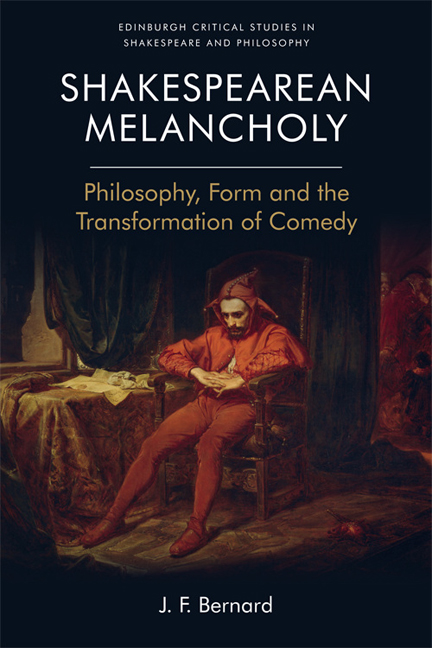Book contents
- Frontmatter
- Contents
- Acknowledgements
- Series Editor's Preface
- Miscellaneous Frontmatter
- 1 What's so Funny about Humours? Melancholy, Comedy and Revisionist Philosophy
- 2 Comic Symmetry and English Melancholy
- 3 Melancholic Dissonance and the Limits of Psycho-Humoralism
- 4 Melancholic Ambience at the Comic Close
- 5 Melancomic Time in Late Shakespeare
- 6 The Philosophical Afterlives of Shakespearean Melancholy
- Works Cited
- Index
5 - Melancomic Time in Late Shakespeare
Published online by Cambridge University Press: 14 September 2018
- Frontmatter
- Contents
- Acknowledgements
- Series Editor's Preface
- Miscellaneous Frontmatter
- 1 What's so Funny about Humours? Melancholy, Comedy and Revisionist Philosophy
- 2 Comic Symmetry and English Melancholy
- 3 Melancholic Dissonance and the Limits of Psycho-Humoralism
- 4 Melancholic Ambience at the Comic Close
- 5 Melancomic Time in Late Shakespeare
- 6 The Philosophical Afterlives of Shakespearean Melancholy
- Works Cited
- Index
Summary
‘Your stuff's been pretty peculiar. What was The Winter's Tale about? I ask to be polite.’
(Ben Jonson to Shakespeare, Peter Whelan's The Herbal Bed)In The Future of Nostalgia, Svetlana Boym discusses the work of early twentieth-century photographer Jacques-Henri Lartigue, ‘who used still images to capture motion’. Lartigue, she explains,
worked against the media; instead of making his photographic subjects freeze in a perfect still, he captured them in motion, letting them evade his frame, leaving blurry, overexposed shadows in the dark background. Fascinated by the potential of modern technology, Lartigue wanted photography to do what it cannot do, namely, capture motion. Intentional technical failure makes the image at once nostalgic and poetic.
In this chapter, I suggest that a similar ‘intentional technical failure’ is at play in Shakespeare's late works and their sustained engagement with melancholy. A great deal has already been written about these plays in terms of their problematic taxonomy. According to Anne Barton, ‘the last plays as a group flaunt their own impossibilities and theatrical contrivance … Only the emotions generated are, miraculously, real’. Shakespeare's late plays are generic quagmires in themselves, and the ongoing critical debate as to what to call these works – romances, tragicomedies or the more straightforward ‘late plays’ put forth most convincingly by Gordon McMullan – testifies to their oddly successful blend of tragic and comic elements. Here, I look at The Winter's Tale and Pericles (and briefly, to The Two Noble Kinsmen) to examine the notion that late Shakespearean works question the recuperative powers of humour in the face of significant temporal and traumatic gaps. In their first halves, the plays stage instances of deep familial loss, displacement and mourning that endure over lengthy periods of time within each dramatic narrative. Each play then shifts to self-contained humorous scenes (as momentary interludes) before moving on to the kind of joyous and restorative conclusions expected of comedy. Yet the profound melancholy created by the tragic events in each play (purported losses of time, identity and familial bonds) is never fully dissipated from the stage. It looms over the lighter concerns of later scenes and seriously undermines the attempts at celebratory reconciliation found in each work.
- Type
- Chapter
- Information
- Shakespearean MelancholyPhilosophy, Form and the Transformation of Comedy, pp. 174 - 212Publisher: Edinburgh University PressPrint publication year: 2018



